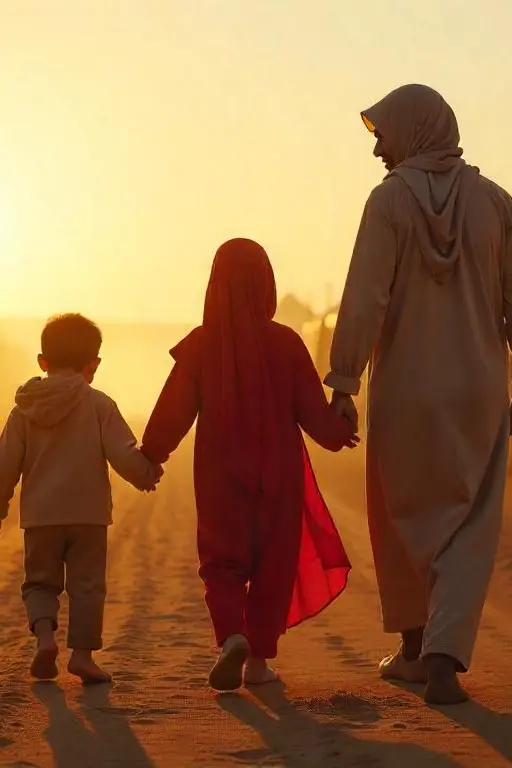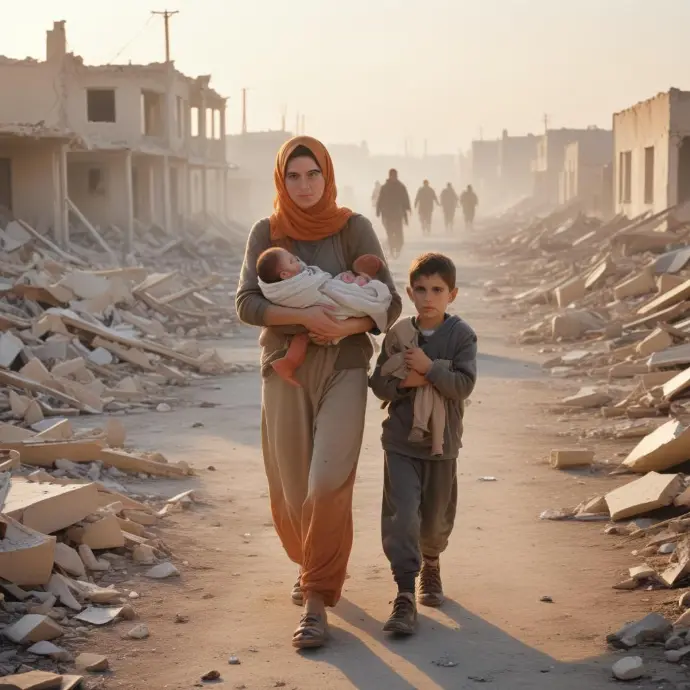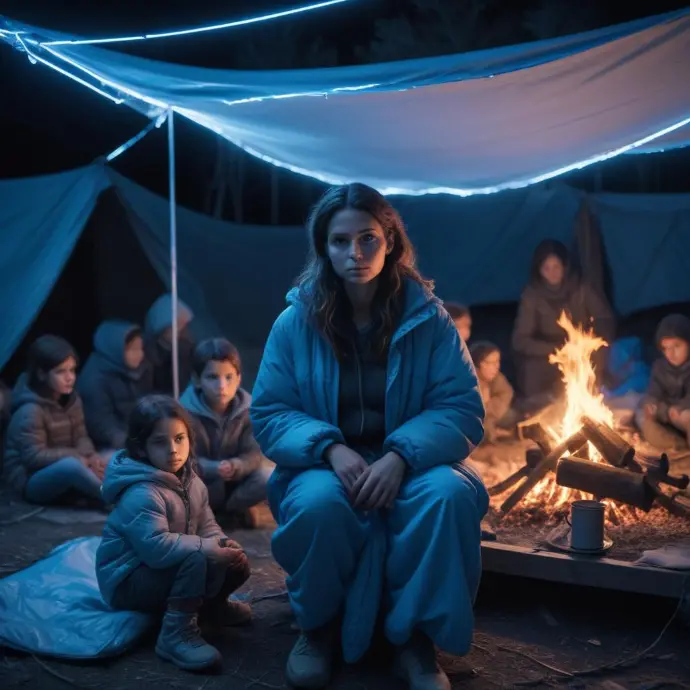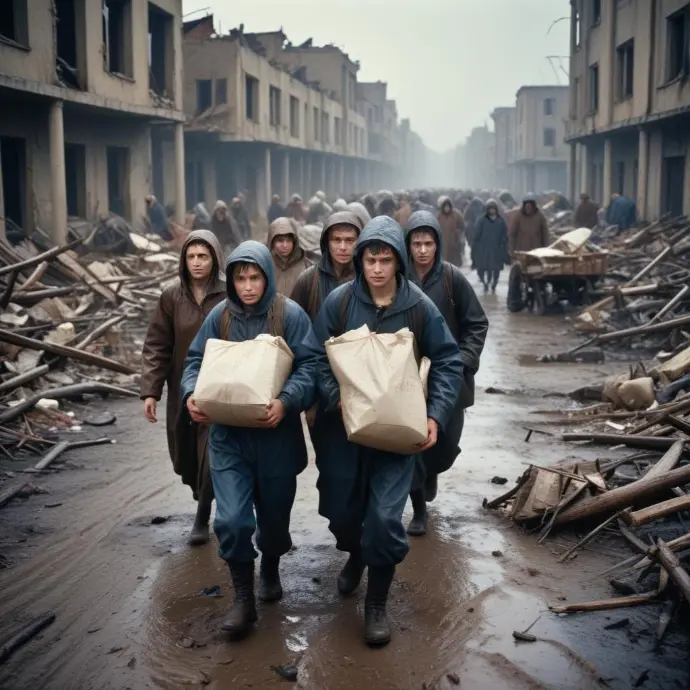War Refugees: Challenges in Seeking Asylum and Human Rights
On our page "War Refugees: Challenges in the Search for Asylum and Human Rights," we will comprehensively explore the challenges refugees face in their search for asylum amidst armed conflict. Prepare to dive into an in-depth analysis of this globally relevant topic, one that will inspire reflection and action.

Introduction
In the context of the global refugee crisis, it is critical to understand the situation of war refugees and the challenges they face in seeking asylum and the protection of their human rights. Seeking asylum and protecting human rights are essential elements in ensuring the safety and well-being of those forced to flee armed conflict. The following will explore in detail the definition of war refugees, the current situation they face, and the crucial importance of seeking asylum and protecting human rights in this context.
War refugees are individuals forced to leave their countries of origin due to armed conflict, persecution, generalized violence, or other life-threatening situations. Refugee status is granted to those who have demonstrated a well-founded fear of persecution for reasons of race, religion, nationality, membership in a particular social group, or political opinion, or who have been internally displaced as a result of armed conflict.
The definition of war refugees is crucial in the context of international protection, as it determines who is eligible for asylum and protection in other countries. The 1951 Convention relating to the Status of Refugees and its 1967 Protocol establish the legal definitions of refugees and the rights and obligations of countries regarding the protection of war refugees.
It is essential to highlight that war refugees face significant challenges when seeking asylum and the protection of their human rights, and understanding their situation is essential to adequately address these complex issues.
Currently, the world is facing an unprecedented refugee crisis, with millions of people fleeing armed conflicts in countries such as Syria, Afghanistan, South Sudan, Myanmar, and many others. These war refugees are in a situation of extreme vulnerability, facing forced displacement, separation from their families, precarious living conditions, and risks to their physical and psychological integrity.
Furthermore, war refugees often face significant obstacles when attempting to access asylum in other countries, including a lack of safe legal avenues, restrictive immigration policies, discrimination, and xenophobia. These challenges increase refugees' exposure to exploitation, abuse, and violence, underscoring the urgent need to address their protection and humanitarian assistance needs.
The current situation of war refugees requires a globally coordinated response to ensure they receive the protection and support they desperately need.
Asylum seeking and the protection of human rights are critical to ensuring the safety and well-being of war refugees. The right to asylum is a fundamental principle of international law that recognizes the right of individuals to seek protection from persecution and danger in other countries. Ensuring access to asylum and respect for the human rights of war refugees is a shared responsibility of the international community and each individual State.
Respect for the human rights of war refugees, including the right to life, liberty, security, non-refoulement (principle of non-refoulement), and protection from torture and other cruel, inhuman, or degrading treatment, is essential for their dignity and survival. Seeking asylum and protecting human rights also contribute to international stability and peace by addressing the root causes of armed conflict and violence.
Seeking asylum and protecting human rights are essential components of the humanitarian response to the war refugee crisis, and their importance cannot be underestimated in the search for durable and sustainable solutions to this complex issue.
Challenges for War Refugees in Seeking Asylum
The situation of war refugees presents a number of significant challenges in their search for asylum and international protection. These challenges range from limited access to international protection to the precarious conditions they face in refugee camps, as well as legal and bureaucratic obstacles in the asylum application process.
War refugees face limited access to international protection, which makes it difficult for them to seek asylum in other countries. They often encounter border restrictions and immigration policies that make it difficult to enter countries that could offer them refuge. This limited access to international protection jeopardizes the safety and well-being of these individuals seeking to escape violence and persecution in their countries of origin.
Furthermore, a lack of coordination and cooperation among receiving countries also contributes to this situation, further hindering the ability of war refugees to find a safe haven. This lack of access to international protection represents a significant obstacle in their search for asylum and human rights.
Once war refugees gain access to a host country, they face precarious conditions in refugee camps. These settings are often overcrowded, with limited resources and insufficient basic services to meet refugees' health, food, and housing needs. This situation contributes to these people's vulnerability, exposing them to risks of disease, malnutrition, and violence.
The lack of adequate conditions in refugee camps represents an additional challenge for war refugees, as it affects their ability to rebuild their lives in a safe and stable environment. This precariousness in refugee camps highlights the urgency of improving reception conditions and ensuring the dignity and well-being of war refugees in their search for asylum.
Once war refugees gain access to a receiving country, they face legal and bureaucratic challenges in the asylum application process. This process can be complex and lengthy, with requirements and procedures that represent significant obstacles for those seeking international protection. The lack of legal counsel, the costs associated with the process, and language barriers further complicate the asylum search for war refugees.
Furthermore, the lack of resources and capacity of asylum systems in some receiving countries can lead to additional delays and difficulties for war refugees. These legal and bureaucratic challenges represent a significant barrier to their path to obtaining international protection and fully exercising their human rights.
The experience of being a war refugee has a significant psychological and emotional impact on people forced to flee their homes due to armed conflict. Refugees face elevated levels of stress, anxiety, and depression as a result of witnessed violence, the loss of loved ones, uncertainty about the future, and difficulties adapting to a completely new environment. This impact can be even greater for children, who are especially vulnerable to psychological trauma that can affect their emotional and cognitive development.
Lack of access to adequate mental health services further exacerbates the situation for war refugees. The scarcity of resources and the stigmatization of mental health issues in some host communities make it difficult for refugees to receive the support they so desperately need. This scenario contributes to a vicious cycle in which refugees' emotional and psychological difficulties are not effectively addressed, which in turn negatively impacts their ability to adapt to their new lives and rebuild a sense of safety and emotional well-being.
It is essential that governments, humanitarian organizations, and the international community recognize the importance of providing psychological and emotional support to war refugees. This involves ensuring access to quality mental health services, promoting awareness campaigns to reduce the stigma associated with mental disorders, and encouraging the integration of psychosocial support strategies into humanitarian assistance programs. Addressing the psychological and emotional impact on war refugees is essential to protecting their human rights and promoting their overall well-being as they seek asylum and rebuild their lives.
Human Rights Challenges in the Context of War and Refugees
The violation of fundamental rights during armed conflicts is a heartbreaking reality that affects millions of people around the world. During war situations, civilians face systematic violations of their rights, including the right to life, liberty, and physical integrity. The lack of effective protection, persecution, and indiscriminate violence are constant challenges for those seeking refuge and asylum in other countries. The absence of a safe environment and exposure to situations of extreme violence put the lives and well-being of war refugees at risk, generating a large-scale humanitarian crisis.
The violation of fundamental rights during armed conflicts also has a devastating impact on children, with a high number of children exposed to violence, forced recruitment, separation from their families, and lack of access to education. Protecting children's rights in situations of armed conflict is essential to ensuring their well-being and future development. The international community faces the challenge of providing a safe environment and effective protection to child refugees from war, recognizing their vulnerability and specific needs.
The violation of fundamental rights during armed conflict represents a significant challenge for the international community, which must work together to ensure the protection of the human rights of war refugees and promote accountability for violations.
Limited access to basic services and healthcare is one of the most pressing challenges facing war refugees in their asylum search. Lack of resources, poor infrastructure, and a shortage of trained personnel in host countries hinder access to essential services, such as housing, food, clean water, and healthcare. This situation puts the health and well-being of refugees at risk, especially those who have suffered physical injuries or psychological trauma as a result of the armed conflict.
Limited access to basic services also disproportionately affects vulnerable groups, such as women, children, older adults, and people with disabilities, who face additional obstacles to meeting their basic needs and accessing adequate healthcare. The lack of psychosocial and mental health support services further exacerbates the situation, leaving war refugees at greater risk of emotional and mental trauma without the necessary specialized care.
The international community, in collaboration with humanitarian organizations and government agencies, must urgently address the challenge of limited access to basic services and healthcare for war refugees, ensuring they receive the necessary assistance to rebuild their lives and recover from the aftermath of armed conflict.
Gender-based violence and the protection of vulnerable groups represent critical challenges in the context of war refugees. Refugee women and girls are especially vulnerable to gender-based violence, including rape, forced child marriage, human trafficking, and sexual exploitation. The lack of effective protection and the absence of mechanisms to report and prevent gender-based violence exacerbate these women's vulnerability, leaving them in a situation of extreme precariousness and risk.
Furthermore, other vulnerable groups,people with disabilities, and ethnic or religious minorities, face specific challenges in their search for asylum and protection during and after armed conflict. Discrimination, stigma, and the lack of recognition of their fundamental rights contribute to their marginalization and exposure to violence and abuse.
It is essential that the international community and host countries implement specific policies and programs to address gender-based violence and protect vulnerable groups, ensuring their safety, well-being, and access to specialized services. Promoting gender equality and protecting the rights of all vulnerable groups are essential elements for ensuring a comprehensive and effective humanitarian response in the context of war refugees.
The protection of child refugees from war represents one of the most urgent and complex challenges in the field of human rights. These children and adolescents face extreme vulnerability, with the loss of their homes, separation from their families, psychological trauma, and lack of access to education and healthcare.
Furthermore, child refugees from war are often exposed to the risks of recruitment by armed groups, sexual violence, labor exploitation, and human trafficking. The lack of a safe and protective environment, along with the absence of adequate legal and social structures in host countries, significantly exacerbates the situation of these children.
The need to develop comprehensive strategies that address the protection, education, healthcare, and psychological support of child refugees from war is fundamental. Likewise, it is crucial to promote collaboration between governments, international organizations, NGOs, and civil society to guarantee a safe and stable environment for these children, as well as to ensure respect for their fundamental human rights.
Impact of the Refugee Crisis on Armed Conflict Resolution
The refugee crisis generated by armed conflicts has a significant impact on the perpetuation of these conflicts. The massive flight of people from their countries of origin due to violence and political persecution contributes to the destabilization of the region, fueling a cycle of ongoing conflict and displacement. This situation not only affects the refugees themselves but also puts pressure on neighboring countries hosting these displaced persons, which can lead to additional tensions and border conflicts.
Furthermore, the presence of large numbers of refugees can overwhelm the resources and services available in receiving countries, which in turn can generate resentment and tensions with local communities. This dynamic can create a breeding ground for radicalization and recruitment by armed groups, further exacerbating the situation and hindering the peaceful resolution of conflicts.
Therefore, it is crucial to address the refugee crisis as an integral part of efforts to resolve armed conflicts, as its impact on regional stability and the possibility of achieving sustainable peace cannot be underestimated.
The search for asylum by war refugees poses significant challenges for mediation and negotiation in the peaceful resolution of armed conflicts. The diversity of interests, demands, and needs of the parties involved in the conflict, including refugees and host communities, complicates the negotiation and mediation process.
Furthermore, the presence of refugees can influence the dynamics of the conflict by adding new layers of complexity to negotiations, especially if tensions arise between refugees and local communities. Including refugee concerns and demands in the negotiation agenda often requires a careful and sensitive approach to ensure they are addressed fairly and equitably.
Furthermore, the protection of refugees during peace negotiations is critical, as their safety and well-being are essential to ensuring a sustainable peaceful resolution process. This may require the involvement of international bodies, such as UN agencies and human rights organizations, to ensure that refugees' rights are respected and their concerns are effectively addressed in the context of peace negotiations.
Refugee protection plays a crucial role in peace processes, as their safe and meaningful participation is essential to ensuring the sustainability and legitimacy of peace agreements. The inclusion of refugees in peace talks and post-conflict reconstruction planning is essential to addressing the underlying causes of conflict and ensuring lasting peace.
Furthermore, refugee protection in the context of peace processes involves ensuring their physical safety, as well as protecting their human rights and dignity. This may require the implementation of specific measures, such as the creation of safe zones or the mobilization of international peacekeepers to protect refugees during the negotiation process and beyond.
Refugee protection is not only a moral obligation but also an essential element for building sustainable peace and the effective resolution of armed conflicts. Their active and safe participation in peace processes is essential to address the complex realities of the refugee crisis and to lay the foundations for a peaceful and stable future for all parties involved.
International cooperation is essential to address the refugee crisis caused by armed conflicts in different parts of the world. Governments, non-governmental organizations, and humanitarian agencies must join forces to provide humanitarian assistance to refugees, ensure their safety, and protect their fundamental rights. Collaboration between countries of origin, transit, and destination of refugees is essential to finding long-term sustainable solutions.
Furthermore, international cooperation also entails promoting diplomatic and political measures that address the underlying causes of armed conflicts, in order to prevent the generation of new refugee flows. The search for peaceful and diplomatic solutions to armed conflicts is crucial to reducing the number of displaced people and protecting their human rights.
Collaboration between refugee-hosting countries and international agencies, such as UNHCR, is essential to ensure that refugees receive the necessary protection and have access to asylum procedures in an effective and fair manner. Likewise, cooperation in equitable redistribution of the refugee burden among host countries can help alleviate pressure on nations facing greater challenges in receiving refugees.
The Role of Human Rights Defenders in the Protection of War Refugees
The protection of war refugees is a crucial challenge in seeking asylum and ensuring human rights. In this context, legal support and the defense of refugee rights play a fundamental role. Human rights defenders work tirelessly to offer legal advice, representation, and support to war refugees, helping them navigate the complex asylum application processes and providing the necessary assistance to ensure their fundamental rights are respected throughout the process.
In addition to providing direct legal support, human rights defenders also conduct in-depth analysis of laws and policies related to asylum for war refugees, seeking to identify gaps or deficiencies that may hinder their protection. Through research and collaboration with international organizations, human rights defenders advocate for legal reforms that improve access to asylum and guarantee the protection of refugees in situations of armed conflict.
Ultimately, legal support and advocacy for the rights of war refugees by human rights defenders not only seeks to provide immediate relief but also to have a long-term impact on the protection and well-being of those forced to flee their homes due to violent conflict.
Awareness-raising and social mobilization play a crucial role in the asylum-seeking process and the protection of the human rights of war refugees. Human rights defenders work hard to raise public awareness of the realities faced by refugees, highlighting the difficulties and challenges they face in their asylum-seeking and rebuilding lives in a new and often hostile environment.
Through awareness-raising campaigns, educational events, and community activities, human rights defenders seek to generate empathy and solidarity with war refugees, challenging the stigmas and prejudices that often surround this vulnerable population. By fostering a deeper understanding of refugee needs and rights, they seek to mobilize society to actively support the protection and integration of those displaced by armed conflict.
Furthermore, social mobilization coordinated by human rights defenders also seeks to influence government policies and practices, pushing for more compassionate and effective approaches to the protection of war refugees, which can lead to significant changes in legislation and general attitudes toward refugees.
Advocacy and political pressure play a critical role in the protection of war refugees. Human rights defenders work tirelessly to influence government policies and practices, as well as the decisions of international organizations, to ensure that refugees' fundamental rights are respected and that they are provided with the protection they so desperately need.
Advocacy is carried out through the promotion of policies and programs that comprehensively address the needs of refugees, including the provision of humanitarian assistance, resettlement programs, and the creation of safe and legal avenues for access to asylum. Human rights defenders also work to ensure that laws and regulations related to asylum and refugee protection are consistent with international human rights standards and reflect a genuine commitment to the dignity and safety of war refugees.
Furthermore, human rights defenders pressure governments and international institutions through advocacy, lobbying, and citizen mobilization, demanding that international commitments regarding refugees be fulfilled and that concrete measures be taken to address humanitarian crises caused by armed conflict. These actions seek to ensure that war refugees receive the protection and support that will enable them to rebuild their lives in a safe and welcoming environment.
Collaboration with international organizations is essential to guarantee the defense of the human rights of refugees from conflict zones. Organizations such as the United Nations High Commissioner for Refugees (UNHCR) play a crucial role in providing assistance and protection to millions of refugees around the world. Through collaboration with UNHCR and other international agencies, it is possible to establish resettlement programs, provide humanitarian assistance, and promote durable solutions for war refugees.
Furthermore, collaboration with organizations such as the International Organization for Migration (IOM) makes it possible to address the specific challenges refugees face during their asylum search. These organizations work closely with governments and other stakeholders to ensure that refugees' human rights are respected, including access to healthcare, education, and protection from exploitation and abuse.
International cooperation in defending the human rights of refugees is not only essential to provide immediate assistance but also to advocate for political changes that promote the protection and inclusion of refugees in society. Through strategic partnerships with international organizations, it is possible to address the challenges of asylum seeking and work toward sustainable solutions that respect the dignity and rights of war refugees.
Conclusions
The protection of war refugees and the guarantee of their human rights represent a major global challenge. With the increase in armed conflicts in different regions of the world, the number of people displaced by violence and persecution has reached alarming levels. This challenge involves not only providing immediate humanitarian assistance but also establishing effective mechanisms for seeking asylum and protecting refugees' fundamental rights.
The situation of war refugees is complex, as they face obstacles both in their countries of origin and in the places they seek asylum. Lack of access to basic services, discrimination, xenophobia, and the absence of a solid legal framework for their protection are just some of the difficulties these people face.
It is essential to address this challenge from a global perspective, promoting international cooperation and respect for the human rights of refugees at all stages of their displacement, from their flight from war to their possible integration in new host countries.
Addressing the challenges faced by war refugees in their search for asylum and the protection of their human rights requires a comprehensive and collaborative approach by the international community. It is necessary not only to provide immediate humanitarian assistance but also to work on conflict prevention, peace promotion, and the peaceful resolution of disputes.
Collaboration between governments, international organizations, NGOs, and civil society is essential to ensure that refugees receive the protection and support they need. Furthermore, awareness-raising and education about the situation of refugees and the importance of respecting their rights are key tools in the fight against discrimination and xenophobia.
It is crucial that the international community work together to establish policies and mechanisms that facilitate the integration of refugees into host societies, guaranteeing their access to education, employment, healthcare, and other services essential for their well-being and development.
To effectively address the challenges of seeking asylum and protecting the human rights of war refugees, it is essential to promote sustainable solutions for the resolution of armed conflicts. Violence prevention, mediation, and dialogue are key tools for building peace and reducing the number of people displaced by war.
Furthermore, it is necessary to work on the protection of civilians during armed conflicts, ensuring respect for international humanitarian law and human rights principles. Preventing sexual violence, the recruitment of child soldiers, and other serious human rights violations are fundamental aspects of protecting war-affected populations.
In this regard, promoting justice, accountability, and reparation for victims are essential elements for building lasting peace and protecting the human rights of war refugees.

 IHRO NEWS
IHRO NEWS

